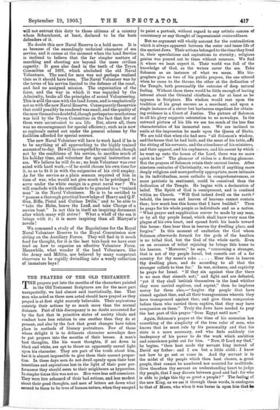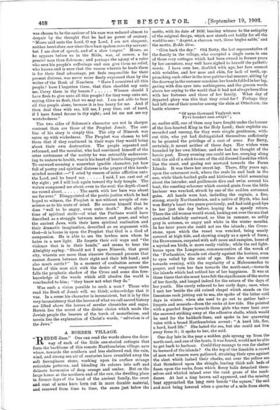THE PRAYERS OF THE OLD TESTAMENT.
T" prayers put into the mouths of the characters painted in the Old Testament Scriptures are for the most part unexpectedly, we had almost said inartistically, fine. That men who acted as these men acted should have prayed as they prayed is at first sight scarcely believable. Their aspirations outstrip their actions by so much more than the normal distance. Part of this discrepancy is no doubt accounted for by the fact that in primitive states of society ideals and conduct bore less relation to one another than they do at present, and also by the fact that great changes have taken place in methods of literary portraiture. Few of those whose delight it is to delineate character nowadays dare to put prayers into the mouths of their heroes. A man's best thoughts, like his worst thoughts, if set down in black and white, are apt to throw an apparently unreal light upon his character. They are part of the truth about him, but it is almost impossible to give them their correct propor- tion. In these days men do not dwell openly upon their best intentions and aspirations lest in the light of their poor per- formance they should seem to their neighbours as hypocrites. Insimpler times this was not so. Men were less self-conscious. They were less ashamed of their bad actions, and less modest about their good thoughts, and men of letters set down what seemed to them to be true of human nature, when they essayed
to paint a portrait, without regard to any artistic: canons of consistency or any thought of impressionist vraisemblance.
But no argument will wholly account for the contradiction which is always apparent between the outer and inner life of the ancient Jews. Their actions belonged to the time they lived in, their 'speculations and aspirations to eternity ; religions genius was poured out to them without measure. We find it where we least expect it. Their world was full of the knowledge of God, as the waters cover the sea. Take Solomon as an instance of what we mean. His bio- graphers give us two of his public prayers, the one uttered when he came to the throne, the other at the dedication of the Temple, both presumably the outcome of deep natural feeling. Without these there would be little enough of lasting interest about the Oriental chieftain, so far at least as he appears in Scripture. His wisdom would rest upon the tradition of his great success as a merchant, and upon a single instance of a clever but barbarous expedient for obtain- ing evidence in a Court of Justice. The picture of Solomon in all his glory suggests ostentation to us nowadays. In the outward picture of his life we see too much of the less fine characteristics of his immortal race. We are inclined to smile at the impression he made upon the Queen of Sheba. We are told that when she had seen "all Solomon's wisdorp, and the house that he had built, and the meat of his table, aifd the sitting of his servants, and the attendance of his ministers, and their apparel, and his cupbearers, and his ascent by which he went up unto the house of the Lord, there was no more spirit in her." The glamour of riches is a fleeting glamour. But the prayers of Solomon retain their ancient lustre. After nineteen centuries of Christianity, we doubt if anything more deeply religious and more perfectly appropriate, more intimate in its individualism, more catholic in comprehensiveness, or more patriotic in sentiment, could be conceived than the dedication of the Temple. He begins with a declaration of _belief. The Spirit of God is omnipresent, and is confined within no Church. " Will God indeed dwell on the earth ? behold, the heaven and heaven of heavens cannot contain thee; how much less this house that I have builded." Then he prays for his whole people as individuals and as a nation. " What prayer and supplication soever be made by any man, or by all thy people Israel, which shall know every man the plague of his own heart, and spread forth his hands toward this house : then hear thou in heaven thy dwelling place, and forgive." In this moment of exaltation the God whom Solomon afterwards forsook for the gods of the heathen is no tribal God, but the God of the whole earth. Even on an occasion of tribal rejoicing he brings this home to his hearers. "Moreover," he says, "concerning a stranger, that is not of thy people Israel, but cometh out of a far country for thy name's sake Hear thou in heaven thy dwelling place, and do according to all that the stranger calleth to thee for." In war, sickness, and captivity he prays for Israel. " If they, sin against thee (for there is no man that sinneth not)," and fight and are defeated, "yet if they shall bethink themselves in the land whither they were carried captives, and repent," then he implores mercy for them also,—" forgive thy people that have sinned against thee, and all their transgressions wherein they have transgressed against thee, and give them compassion before them who carried them captive, that they may have compassion on them." Truly the Jews have needed to pray the last part of this prayer "from Egypt until now."
Again, Solomon's prayer at the time of his accession has something of the simplicity of the true ruler of men, who knows that he must rule by his personality and that his state is a mere accessory, and who feels suddenly the inadequacy of his power to do the work which ambition and conscience point out for him. "Now, 0 Lord my God," he begins, "thou halt made thy servant king instead of David my father : and I am but a little child : I know not how to go out or come in. And thy servant is in the midst of .thy people which thou halt chosen, a, great people, that cannot be numbered nor counted for multitude. Give therefore thy servant an understanding heart to judge thy people, that I may discern between good and bad: for who is able to judge this thy so great a people ?" The feeling of the new King, as we see it through these words, is analogous to that of Moses, who when it was borne in upon him that he
despair by the thought that he had no power of oratory. "Moses said unto the Lord, 0 my Lord, I am not eloquent, neither heretofore, nor since thou hast spoken unto thy servant: but I am slow of speech, and of a slow tongue." Moses, as he appears before us in the Bible, was, of course, a far greater man than Solomon ; and perhaps the agony of a ruler who sees his people's sufferings and can give them no relief, who knows and is sure that the course wherein he leads them is for their final advantage, yet feels responsible for their present distress, was never more finely expressed than by the writer of the Book of Numbers. "Have I conceived all this people ? have I begotten •them, that thou shouldst say unto
me, Carry them in thy bosom P Whence should I have flesh to give unto all this people ? for they weep unto me, saying, Give us flesh, that we may eat. I am not able to bear all this people alone, because it is too heavy for me. And if thou deal thus with me, kill me, I pray thee, out of hand, if I have found favour in thy sight; and let me not see my wretchedness."
The two sides of Solomon's character are not in sharper contrast than are those of the Prophet Jonah. The out- line of his story is simply this. The city of Nineveh was eaten up with wickedness. The Prophet was chosen to tell them that if they continued in their ways they would bring about their own destruction. The people repented and reformed, and the moralist, who had convinced himself of the utter rottenness of the society he was ostensibly endeavour- ing to restore to health, was in his heart of hearts disappointed. To outward seeming a somewhat ignoble character, yet how full of poetry and spiritual distress is the prayer of this harsh- minded moralist :—" I cried by reason of mine affliction unto the Lord, and he heard me I said, I am cast out of thy sight ; yet I will look again toward thy holy temple. The waters compassed me about, even to the soul: the depth closed me round about The earth with her bars was about me for ever." Disappointed of the poetic justice which he had hoped to witness, the Prophet is not without scruple of con- science as to his state of mind. He assures himself that he does "well to be angry, even unto death." But after a time of spiritual strife—of what the Puritans would have described as a struggle between nature and grace, and what the ancient Jews, with their keen spiritual realisation and their dramatic imagination, described as an argument with God—it is borne in upon the Prophet that God is a God of compassion. He is able to see the lawless men whom he hates in a new light. He forgets their evil ways and "the violence that is in their hands," and seems to hear the Almighty saying : " Should not I spare Nineveh, that great city, wherein are more than sixscore thousand persons that cannot discern between their right and their left hand ; and also much cattle ? " In a moment of exaltation across the heart of this man sick with the desire of vengeance there falls the prophetic shadow of the Cross and some dim fore. knowledge of the words which still absolve the world is vouchsafed to him; "they know not what they do."
Was such a vision possible to such a man ? Those who read the Book of Jonah will, we think; acknowledge that it was. In a sense his character is inconsistent, but it is by this very inconsistency that the heroes of what we call sacred history are lifted above the heroes of secular chronicles and sagas. Herein lies the secret of the divine choice which made the Jewish people the bearers of the torch of monotheism, and herein lies the explanation of Christ's words, " salvation is of the Jews."







































 Previous page
Previous page